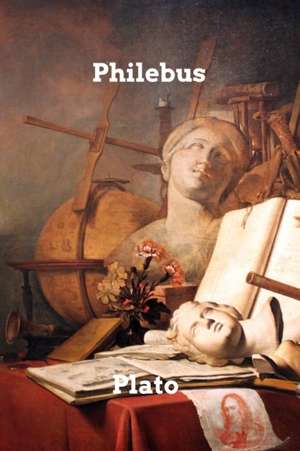Philebus
Autor Platoen Limba Engleză Paperback – 21 aug 2022
| Toate formatele și edițiile | Preț | Express |
|---|---|---|
| Paperback (12) | 47.86 lei 3-5 săpt. | |
| CREATESPACE – | 47.86 lei 3-5 săpt. | |
| Hackett Publishing Company – 14 sep 1993 | 73.94 lei 3-5 săpt. | +14.21 lei 7-11 zile |
| CREATESPACE – | 74.11 lei 3-5 săpt. | |
| CreateSpace Independent Publishing Platform – | 81.50 lei 3-5 săpt. | |
| Penguin Books – 27 oct 1982 | 81.61 lei 3-5 săpt. | +8.22 lei 7-11 zile |
| CREATESPACE – | 85.00 lei 3-5 săpt. | |
| BROADVIEW PR – 30 mai 2019 | 153.33 lei 3-5 săpt. | +11.69 lei 7-11 zile |
| Echo Library – 30 sep 2006 | 72.89 lei 38-44 zile | |
| Blurb – 21 aug 2022 | 91.19 lei 6-8 săpt. | |
| Akasha Classics – 11 noi 2009 | 92.38 lei 6-8 săpt. | |
| 1st World Publishing – 30 sep 2008 | 104.72 lei 6-8 săpt. | |
| TREDITION CLASSICS – 4 noi 2011 | 147.42 lei 6-8 săpt. | |
| Hardback (3) | 157.85 lei 6-8 săpt. | |
| 1st World Publishing – 30 sep 2008 | 157.85 lei 6-8 săpt. | |
| Akasha Classics – 11 noi 2009 | 174.51 lei 6-8 săpt. | |
| Binker North – 2 mar 2020 | 196.51 lei 38-44 zile |
Preț: 91.19 lei
Nou
Puncte Express: 137
Preț estimativ în valută:
17.45€ • 17.87$ • 14.52£
17.45€ • 17.87$ • 14.52£
Carte tipărită la comandă
Livrare economică 18 martie-01 aprilie
Preluare comenzi: 021 569.72.76
Specificații
ISBN-13: 9781006313431
ISBN-10: 1006313435
Pagini: 132
Dimensiuni: 152 x 229 x 7 mm
Greutate: 0.2 kg
Editura: Blurb
ISBN-10: 1006313435
Pagini: 132
Dimensiuni: 152 x 229 x 7 mm
Greutate: 0.2 kg
Editura: Blurb
Notă biografică
Plato was an ancient Greek philosopher born in Athens during the Classical period in Ancient Greece. In Athens, Plato founded the Academy, a philosophical school where he taught the philosophical doctrines that would later become known as Platonism. Plato (or Platon) was a pen name derived, apparently, from the nickname given to him by his wrestling coach - allegedly a reference to his physical broadness. According to Alexander of Miletus quoted by Diogenes of Sinope his actual name was Aristocles, son of Ariston, of the deme Collytus (Collytus being a district of Athens).Plato was an innovator of the written dialogue and dialectic forms in philosophy. He raised problems for what later became all the major areas of both theoretical philosophy and practical philosophy. His most famous contribution is the Theory of forms, which has been interpreted as advancing a solution to what is now known as the problem of universals. He is also the namesake of Platonic love and the Platonic solids.His own most decisive philosophical influences are usually thought to have been, along with Socrates, the pre-Socratics Pythagoras, Heraclitus, and Parmenides, although few of his predecessors' works remain extant and much of what we know about these figures today derives from Plato himself.[a]Along with his teacher, Socrates, and his student, Aristotle, Plato is a central figure in the history of philosophy.[b] Unlike the work of nearly all of his contemporaries, Plato's entire body of work is believed to have survived intact for over 2,400 years.[6] Although their popularity has fluctuated, Plato's works have consistently been read and studied. Through Neoplatonism Plato also greatly influenced both Christian and Islamic philosophy (through e.g. Al-Farabi). In modern times, Alfred North Whitehead famously said: "the safest general characterization of the European philosophical tradition is that it consists of a series of footnotes to Plato.
Descriere
Descriere de la o altă ediție sau format:
An exploration of one of the most fundamental human questions: how to lead a good life. Taking the form of a discussion between the hedonist Philebus, his naive disciple, Protarchus and Socrates, this book is a consideration of the popular belief that pleasure is the greatest attainable good.
An exploration of one of the most fundamental human questions: how to lead a good life. Taking the form of a discussion between the hedonist Philebus, his naive disciple, Protarchus and Socrates, this book is a consideration of the popular belief that pleasure is the greatest attainable good.
